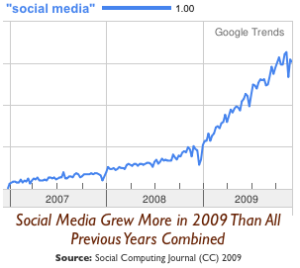Social media gained ground as a tool for marketing and business communications in 2009, and 2010 should prove to be no less significant. What will evolve is a leaner and meaner version of the medium from a business perspective, one that has proved its return on investment value.
Maturation of social media for business should take place on three fronts: aggregation of content, further integration with the mobile Web and, most importantly, improved analytics.
- Building better filters. Because we are inundated with a fire hose of information daily, the need for content filtering will become paramount. In fact, job descriptions will be written around this topic and, as with measurement, software tools will be built to ensure that we only see the content we need.
- Going mobile. Thanks to the iPhone, BlackBerry and, now, Android, the mobile Web will be the third area to gain acceptance in 2010. The real-time, always-on evolution of the Web requires that we stay connected to our communities of practice, and the only way that can be accomplished is through the use of mobile technology.
- Measuring our work. The mystique around measuring social media’s effects will evaporate thanks to better software, as well as a keener understanding of how social media supports business objectives and a better grasp of which metrics a business should track.
The notion that social media is difficult to measure will give way to greater clarity, leading more CEOs and other leaders to readily adopt the technology. No longer will it be considered a “curiosity,” but be seen as an aligned channel designed to integrate with other, more traditional, forms of marketing. The end result will be that, as you indicate, more money will be shifted to online and, specifically, social media.

2010 promises a bright future for social-media endorsement, adoption and engagement. Problems we began wrestling with in 2009 will be more fully addressed in this coming year. The question of “why should we use it” will give way to “how can we use it more effectively.”





